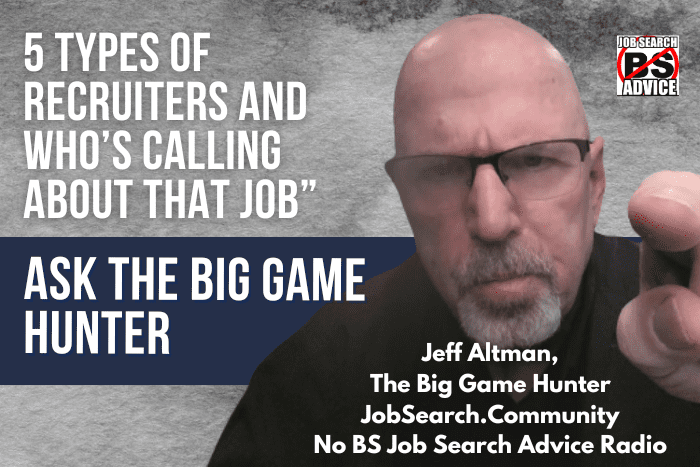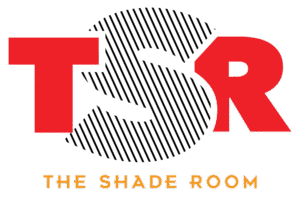By Jeff Altman, The Big Game Hunter
If you’re in the middle of a job search, chances are you’ll cross paths with different types of recruiters. Not all recruiters are the same—and understanding who you’re dealing with can make or break your job search strategy. Some work for the company directly, some are hired guns, and others are middlemen trying to make placements fast. Knowing the difference helps you set realistic expectations, communicate better, and avoid wasting time.
Here are the five main types of recruiters you’re most likely to encounter:
1. Corporate (In-House) Recruiters
Corporate recruiters are employees of the company doing the hiring. They work in Human Resources or Talent Acquisition and handle recruiting for open positions within their organization. Their loyalty is to the company, not to you as a candidate.
They often manage multiple requisitions at once and are tasked with screening resumes, scheduling interviews, and moving candidates through the company’s process. If you’re a good match, they’ll champion you internally—but don’t expect them to coach you on your resume or interview prep. That’s not their job.
Tip: Treat corporate recruiters like gatekeepers. Be professional, prompt, and clear about your qualifications. They can’t bend the rules for you, but they can help you navigate the process.
The Strategic Response to Recruiters and Search Firms
2. Agency (Contingency) Recruiters
Agency recruiters, often called contingency recruiters, only get paid if they place you in a role. They work for staffing agencies or recruiting firms that companies hire to fill positions. Their incentive is straightforward: the more candidates they place, the more commission they make.
These recruiters typically juggle many candidates and clients. They’ll push you for jobs where you’re a fit, but they won’t waste time if they don’t see you as marketable. That may sound harsh, but it keeps things efficient.
Tip: Keep communication short and focused. If they see you as a strong candidate, they’ll keep calling. If not, don’t take it personally—it’s just business.
3. Retained Search Recruiters (Executive Search / Headhunters)
Retained recruiters, sometimes called executive search recruiters or headhunters, operate differently. Companies pay them an upfront fee to fill high-level roles, often in the executive or specialized technical space. Because they’re on retainer, their job is to deliver top-tier talent, not to send out a flood of resumes.
These recruiters do deep research, target passive candidates, and build relationships with executives. If one calls you, it’s because you’ve been handpicked as a potential fit. That’s a compliment—but also a sign to take the conversation seriously.
Transitioning to Another Industry or Field
Tip: Even if the opportunity isn’t right for you, treat these recruiters respectfully. They often work at the top of the market and may call again in the future.
4. Contract Recruiters
Contract recruiters are temporary employees who step in when a company has a hiring spike, a big project, or needs help with recruiting capacity. They’re usually hired for a set period—say, six months—to help fill roles.
Although they work inside the company, they don’t always have the same authority or influence as full-time recruiters. Still, they can move candidates forward in the process, and they’re often motivated to make a good impression so they can land another contract later.
Tip: Don’t dismiss them as “temps.” Treat them like corporate recruiters. They may not be around forever, but while they’re there, they can get you in front of hiring managers.
5. RPO Recruiters (Recruitment Process Outsourcing)
RPO recruiters are a hybrid. Companies outsource part or all of their recruiting process to an external firm, which then provides recruiters who work exclusively on that company’s openings. To you, they may look and act like corporate recruiters—but technically, they’re employed by a vendor.
RPO recruiters follow strict processes and metrics. They’re often judged on time-to-fill or candidate pipeline numbers. They can’t bend rules, and they usually have less sway with hiring managers than in-house staff. But they’re still a crucial part of the process.
Tip: Keep in mind that while they represent the company, they don’t control the company. Manage your expectations and stay professional.
Final Thoughts
Recruiters come in many shapes and sizes, and not all of them are working for you. Their job is to serve the employer first and foremost. That doesn’t mean you can’t benefit—building strong, professional relationships with recruiters can open doors you wouldn’t find on your own. The key is to know what type of recruiter you’re dealing with and adjust your expectations accordingly.
Transitioning to Another Industry or Field
ABOUT JEFF ALTMAN, THE BIG GAME HUNTER

Are you interested in 1:1 coaching, interview coaching, advice about networking more effectively, how to negotiate your offer or leadership coaching? Schedule a free Discovery call.

Connect with me on LinkedIn. Like me on Facebook.
You can order a copy of “Diagnosing Your Job Search Problems” for Kindle on Amazon and receive free Kindle versions of “No BS Resume Advice” and “Interview Preparation.” If you are starting your search, order, “Get Ready for the Job Jungle.”
Would you like to talk through a salary negotiation or potential negotiation you’re involved with? Order and schedule time with me.
Do you have questions or would like advice about networking or any aspect of your search. Order and schedule time with me.
Would you like me to critique your resume? Order a critique from me
Jeff’s Kindle book, “You Can Fix Stupid: No BS Hiring Advice,” is available on Amazon.





